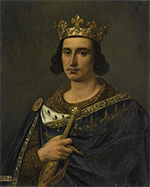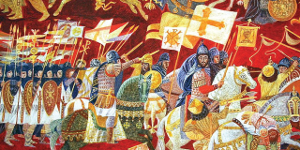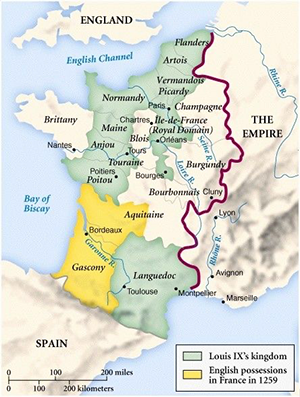The French King Louis IX
Louis IX was King of France for more than three decades. He was considered a model ruler and religious icon and died on Crusade. 
He was born on April 25, 1214, in Poissy. His father was the heir to the throne, who became King Louis VIII. When young Louis was born, his grandfather, Philip II, was the reigning monarch. As boy, young Louis had a courtly education, learning everything that his father and grandfather thought that he would need in order to be an effective monarch: reading, writing, Latin, public speaking, politics, hunting, riding, and warfare. When young Louis was 9, his grandfather died and his father became king. Just three years later, in 1226, his father died and the 12-year-old was suddenly King of France himself. His mother, Blanche of Castile, acted as his regent. At some time point, Louis began to rule in his own right. This might have occurred after he got married, to Margaret of Provence, on May 27, 1234. They eventually had 11 children together. His mother had a strong influence on him for the rest of her life; she died in 1252. One of the things that Queen Margaret had relished in her time as queen consort and then regent was the Albigensian Crusade, a large-scale effort to eliminate the Cathars in the Languedoc region. Margaret stopped this campaign in 1229. (The Cathars were wiped out several years later.) The resulting treaty included a royal marriage to seal the deal that would result in the eventual transfer of the Languedoc to the royal demesne. In 1242, Louis enjoyed a great victory at Taillebourg, defeating the armies of a French nobleman in rebellion, Hugh X of Lusignan, and England's King Henry III. Louis' victory gave him castles and other trappings of power once enjoyed by Hugh of Lusignan and more territories that had been in English hands. (An earlier attempt at territory reacquisition by Henry III, despite having support also from the other prime French noble rebel, Peter of Dreux, had ended the same way.) 
Both Queen Margaret and the new queen, Blanche, were devout Christians, and both women impressed on Louis the need to be the same. He went on two Crusades, the Seventh and the Eighth. For the former, Louis led a large contingent of Crusaders in a series of attacks on Egypt, in 1249–1250. Louis himself suffered captivity after his army lost at the Battle of Al Mansurah; the ransom was an exorbitant sum of money and the return of the city of Damietta, one of the Crusaders' few successes. Louis chose to stay in the Middle East after securing his release, helping Crusaders shore up their defenses. He returned to France in 1254. Queen Margaret had accompanied Louis on Crusade and had organized his ransom; she chose to return to France after securing her husband's release. 
During his long reign, Louis enjoyed much prestige throughout Europe. He did what he could to increase this by marrying his daughters to European princes, but he also did much to single out his country and Paris in particular as the model for other rulers and their subjects to follow in terms of the arts, justice, and piety. He encouraged the founding of the Sorbonne, one of the first universities in the world. He more than once served as arbiter of disputes between other European rulers. Louis had built the Saine-Chapelle, a large chapel that he considered his personal place of worship, filling it with several well-known religious relics. His reputation for religious zeal was such that in 1297, more than two decades after his death, Pope Boniface VIII declared him a saint. (Regrettably for non-Christians, he targeted Jewish people with laws against banking and expanded the scope of the Inquisition to include the burning of Jewish sacred texts.) The Eighth Crusade, in 1270, had as a goal confronting a new enemy, the Mamluks, who in 1260 had defeated the mighty Genghis Khan and his Mongol Army at Ain Jalut (The Mongols would never again try to invade the Middle East.) and, eight years later, ravaged Antioch. This Crusade had little success. Louis and his three surviving sons (his first-born son, Louis, having died in 1260) joined in the Eighth Crusade. (Also among the Crusader army was England's heir apparent, William.) The Crusaders landed at Carthage on July 17, 1270. Before they could complete their mission, they suffered a bout of dysentery. This killed Louis, who died on August 25. Succeeding him as King of France was his oldest son, who became Philip III. Louis IX is the only French king to have been canonized. A great many things are named after him, including religious orders in France, hospitals in Thailand, and many cities in the New World, perhaps most notably St. Louis, Mo. He is the patron saint of the island of Mauritius. |
|
Social Studies for Kids
copyright 2002–2026
David White




